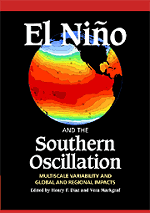Book contents
- Frontmatter
- Contents
- Contributors
- Acknowledgments
- Preface
- SECTION A Global and Regional Characteristics and Impacts of ENSO Variability
- 1 ENSO and Climatic Variability in the Past 150 Years
- 2 Understanding and Predicting Extratropical Teleconnections Related to ENSO
- 3 Global Modes of ENSO and Non-ENSO Sea Surface Temperature Variability and Their Associations with Climate
- 4 Multiscale Streamflow Variability Associated with El Niño/Southern Oscillation
- 5 El Niño/Southern Oscillation and the Seasonal Predictability of Tropical Cyclones
- 6 Climate and ENSO Variability Associated with Vector-Borne Diseases in Colombia
- SECTION B Long-Term Changes in ENSO: Historical, Paleoclimatic, and Theoretical Aspects
- Index
3 - Global Modes of ENSO and Non-ENSO Sea Surface Temperature Variability and Their Associations with Climate
from SECTION A - Global and Regional Characteristics and Impacts of ENSO Variability
Published online by Cambridge University Press: 04 August 2010
- Frontmatter
- Contents
- Contributors
- Acknowledgments
- Preface
- SECTION A Global and Regional Characteristics and Impacts of ENSO Variability
- 1 ENSO and Climatic Variability in the Past 150 Years
- 2 Understanding and Predicting Extratropical Teleconnections Related to ENSO
- 3 Global Modes of ENSO and Non-ENSO Sea Surface Temperature Variability and Their Associations with Climate
- 4 Multiscale Streamflow Variability Associated with El Niño/Southern Oscillation
- 5 El Niño/Southern Oscillation and the Seasonal Predictability of Tropical Cyclones
- 6 Climate and ENSO Variability Associated with Vector-Borne Diseases in Colombia
- SECTION B Long-Term Changes in ENSO: Historical, Paleoclimatic, and Theoretical Aspects
- Index
Summary
Abstract
In this chapter we review much of the recent work by others regarding the nature of the global modes of sea surface temperature (SST) variability and the SST involvement in interannual to multidecadal climate variability. We also perform our own analysis of global SST so as to describe the SST variability associated with El Niño/Southern Oscillation (ENSO) and the low-frequency modes not associated with ENSO (non-ENSO). ENSO is a global phenomenon with significant phase propagation between basins, which we preserve and describe using complex multivariate analysis and subsequently remove from the global SST data. A similar analysis of the residuals reveals three non- ENSO modes of low-frequency variability related to signals described in the reviewed literature: (1) a secular trend representing the global warming signal with associated superimposed decadal variability; (2) an interdecadal mode with maximal realization in the extratropical North Pacific; and (3) a multidecadal mode with maximal realization in the extratropical North Atlantic. Relationships between SST and precipitation are analyzed with regression and multivariate analyses. These analyses show for the interannual-to-decadal timescales of the Western Hemisphere tropics that tropical Atlantic SST is comparable to the Pacific ENSO in its relevance to regional rainfall and is not redundant with respect to ENSO. Moreover, non-ENSO variability explains a significant fraction of the total cross-covariance between the two variables, and out-of-phase relationships between Pacific and tropical North Atlantic SST anomalies are associated with very strong rainfall departures over Central America and the Caribbean.
- Type
- Chapter
- Information
- El Niño and the Southern OscillationMultiscale Variability and Global and Regional Impacts, pp. 89 - 112Publisher: Cambridge University PressPrint publication year: 2000
- 2
- Cited by



